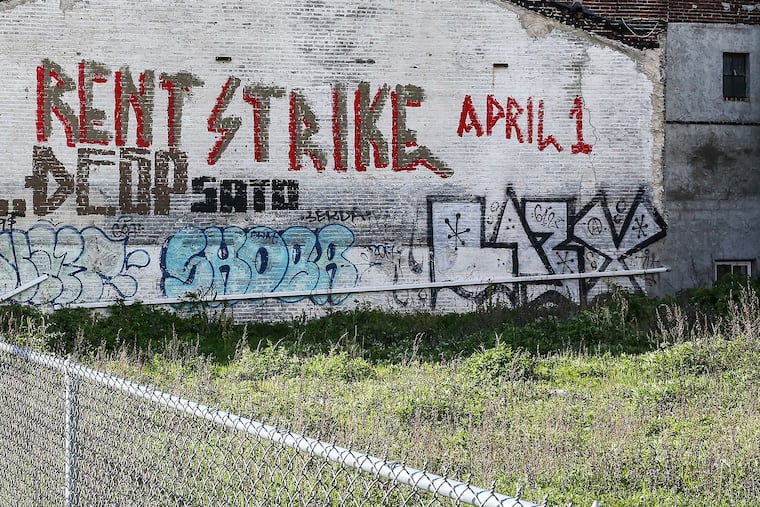Philly landlords sue to overturn new coronavirus pandemic renter protections
The lawsuit comes as housing advocates are preparing for an expected wave of evictions as temporary reprieves expire and landlord-tenant courts resume operations.

Philadelphia landlords are suing to block a package of newly enacted city housing bills meant to keep financially struggling tenants in their homes, saying the measures unilaterally rewrite leases and seek to place all the financial burden for the coronavirus pandemic on those leasing properties.
In a lawsuit filed in federal court Monday, the Homeowners Association of Philadelphia (HAPCO) asked a judge to declare the ordinances unconstitutional and to void the new laws, which, among other measures, bar landlords from initiating eviction proceedings for failure to pay rent through Aug. 31.
“Landlords throughout the city are still required to pay their mortgages, property taxes and other expenses related to the leased properties,” the suit says. “There is no similar COVID-19 financial hardship provision” for them.
HAPCO, an industry organization representing more than 1,900 landlords managing more than 10,000 residential and commercial properties in Philadelphia, filed the suit as housing advocates prepare for an expected wave of evictions due to the economic impact of coronavirus shutdown orders over the last four months.
Hundreds of thousands of city workers have either lost their jobs or seen their hours cut at work, while many small businesses have been forced to operate at a shoestring level or close entirely, cutting into the revenue they depend upon to pay rent for their storefronts.
A state moratorium on evictions due to unpaid rent and the pandemic-related closure of the city’s landlord-tenant court, have thus far protected tenants from being put out on the street.
» READ MORE: Philly’s small landlords can apply for loans to offset missed rent during the pandemic
However, the state eviction ban is set to expire Friday. And up until a last-minute reprieve, courts had been set to resume hearing eviction cases this week. (Landlord-tenant court is now set to reopen Sept. 2, under an administrative order issued Thursday by the First Judicial District.)
City Council — led by Councilmembers Helen Gym, Kendra Brooks, and Jamie Gauthier — sought to cut through that cloud of uncertainty for tenants with their package of five bills last month that, in addition to extending the eviction suspension, barred landlords from charging late fees or interest on back rent owed and required them to offer payment plans to financially struggling tenants and to submit to a mediation process before seeking to evict them.
Mayor Jim Kenney signed the bills into law July 1.
» READ MORE: Philadelphia delays reopening of landlord-tenant court, a reprieve for renters struggling during the pandemic
HAPCO argued in its suit Monday that the new measures run roughshod over their rights to recoup their own pandemic-related losses and are actually a Trojan horse set of laws meant to address historic housing inequities in the city that have nothing to do with the pandemic.
“The act provides absolutely no way for landlords to challenge a tenant’s claim of financial hardship,” HAPCO’s attorney Colin Dougherty of the law firm Fox Rothschild wrote in court papers. “To the contrary, a tenant can claim anything they want and the landlord is forced to accept the representation.”
» READ MORE: City Council passes housing bills to help Philly renters during the pandemic
Renters make up more than 50% of the city’s population — with more than half paying more than 30% of their monthly income to cover housing costs. Nearly a third spend more than half their paychecks on rent and, even before the pandemic, one in 14 renters in the city faced eviction each year, according to city statistics.
Gym, the lead sponsor of the housing bills in City Council, responded to the landlord association’s legal challenge Monday in a series of tweets that described it as frivolous and hypocritical. She said HAPCO had been heavily involved in discussions about crafting the bill and, in fact, had participated on a task force that recommended landlord-tenant mediation as a precursor to evictions — one of the measures the group is now suing to block.
“I’m appalled at HAPCO’s relentless effort to pit landlords against tenants rather than to find common cause in creating sensible and humane alternatives to a crisis that impacts so many,” she said. “We need to manage a crisis, not exacerbate one.”
City Solicitor Marcel Pratt said he remained confident that ordinances would stand up in court.
“These ordinances provide relief at a time when our most vulnerable communities need it the most, while also appropriately balancing and protecting the rights of landlords and property owners,” he said in a statement. “We have absolute confidence that the ordinances are legal, and this lawsuit has not changed our certainty one bit.”
U.S. District Judge Cynthia M. Rufe has not yet set a date for a hearing on the case.
The Philadelphia Inquirer is one of more than 20 news organizations producing Broke in Philly, a collaborative reporting project on solutions to poverty and the city’s push toward economic justice. See all of our reporting at brokeinphilly.org.